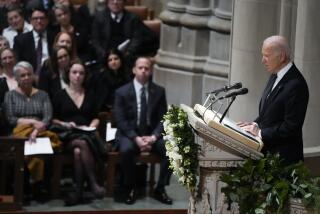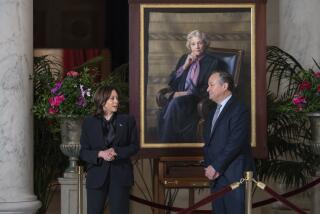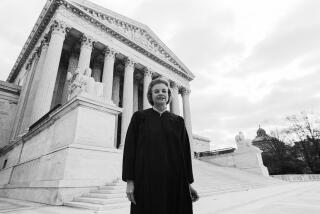Ginsburg: Bench Needs More Women : Law: Leadership is not a matter of gender, she tells State Bar in her first speech since becoming Supreme Court justice.
In her first public speech since becoming a justice of the U.S. Supreme Court, Ruth Bader Ginsburg on Thursday told a state conference of lawyers that more needs to be done to advance women through the judicial ranks.
“There are still those who insist men have an edge in power positions . . . because men are more aggressive than women,” Ginsburg said.
For the record:
12:00 a.m. Oct. 19, 1994 For the Record
Los Angeles Times Wednesday October 19, 1994 Orange County Edition Metro Part B Page 3 Column 6 Orange County Focus Desk 2 inches; 38 words Type of Material: Correction
Justice Ginsburg--A Sept. 23 article about a speech by Supreme Court Justice Ruth Bader Ginsburg in Anaheim misstated the number of times she has made speeches since joining the court. While she has appeared in many other states, this was her first speech in California.
Rather than a “ruthless tough guy,” a good judge is someone who can mediate between opposing factions, and that is not dependent on a person’s gender, she said.
Ginsburg spoke on the first day of the weekend-long annual meeting of the State Bar of California at the Anaheim Convention Center and Anaheim Hilton and Towers.
About 4,000 lawyers, judges and others interested in legal affairs are expected to attend the four-day conference.
Earlier Thursday, Marilyn Tucker Quayle, lawyer, author and wife of former Vice President Dan Quayle, spoke at the conference on national health care issues and legal ethics.
Thursday night, Ginsburg, 61, focused on women’s rights and advances. A former federal appeals court judge, Ginsburg became the second woman appointed to the highest court in the nation when President Clinton selected her in June, 1993.
“Women today make up close to a third of Clinton’s nominees to the federal bench,” she said. “Is it a critical mass? Not yet.”
While she said she believes neither men nor women have a lock on any particular personality traits, women can bring certain concerns, including family leave time for parents, to their jobs if more of them climb the judicial ladder.
“These issues must become human issues, not just women’s issues,” she said.
From 1973 to 1976, Ginsburg strongly advocated women’s interests on the opposite side of the bench, arguing six women’s rights cases before the Supreme Court.
When she directed the Women’s Rights Project of the American Civil Liberties Union, Ginsburg tried to persuade justices that laws discriminating between men and women were based on stereotypes and were usually unconstitutional. She often fought for men’s rights and represented men as plaintiffs, as well.
Despite her record as a women’s rights champion, Ginsburg also has criticized some aspects of Roe vs. Wade, the 1973 Supreme Court ruling that declared women had a constitutional right to an abortion.
In Thursday’s morning session, Marilyn Quayle touched on health care issues.
Quayle said she believes Clinton’s plan for national health care reform never will be enacted and that she favors other, smaller-scale reforms. She said she expects the federal government eventually to privatize Medicaid and Medicare programs.
Most of her comments had to do with legal ethics and honesty.
“If we don’t reflect right or wrong, then we should not be surprised when our young people think they can get away with anything,” said Quayle, an Indianapolis lawyer.
“We have to remember what is legal may not be responsible,” she warned other attorneys.
During the remaining days of the conference, about 500 delegates of the state bar will meet and issue resolutions on several legal issues. Some of the resolutions they are considering would advocate:
* Adding provisions to the civil code that would allow the terminally ill to request the means to kill themselves.
* Making manufacturers and dealers of handguns and assault weapons liable for damages in certain situations involving violence that is linked to those weapons.
More to Read
Get the L.A. Times Politics newsletter
Deeply reported insights into legislation, politics and policy from Sacramento, Washington and beyond. In your inbox three times per week.
You may occasionally receive promotional content from the Los Angeles Times.






